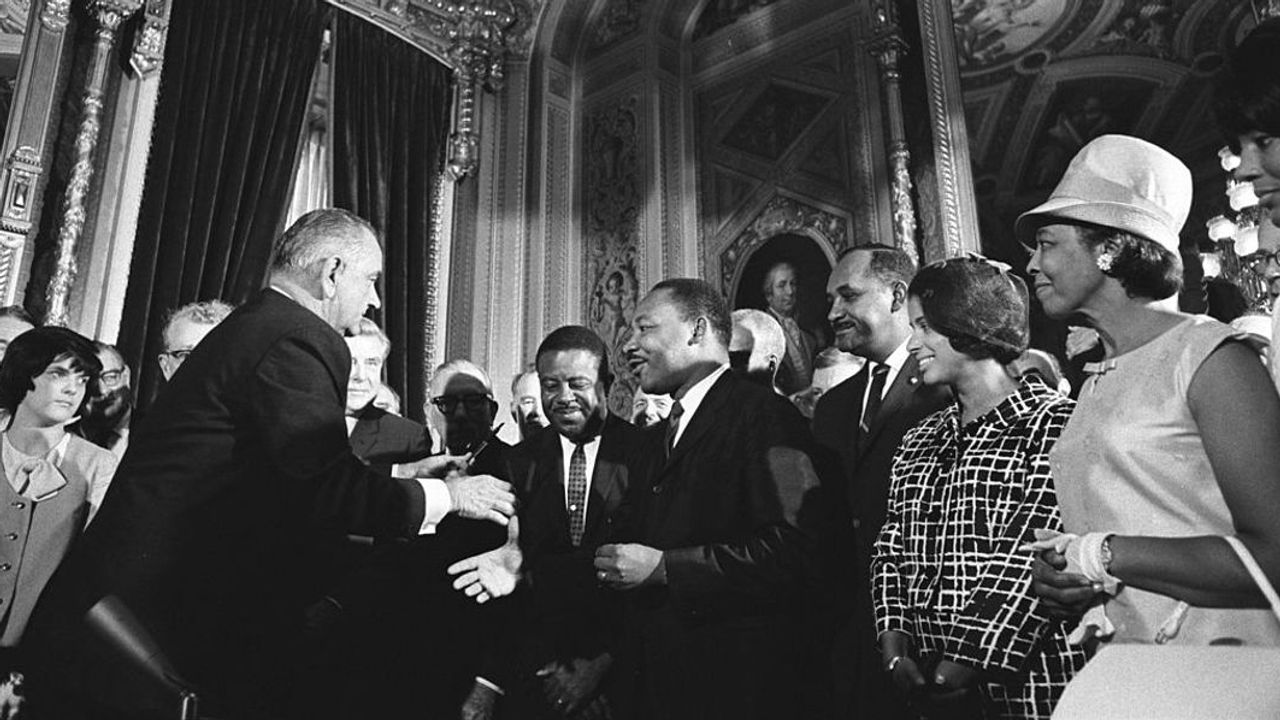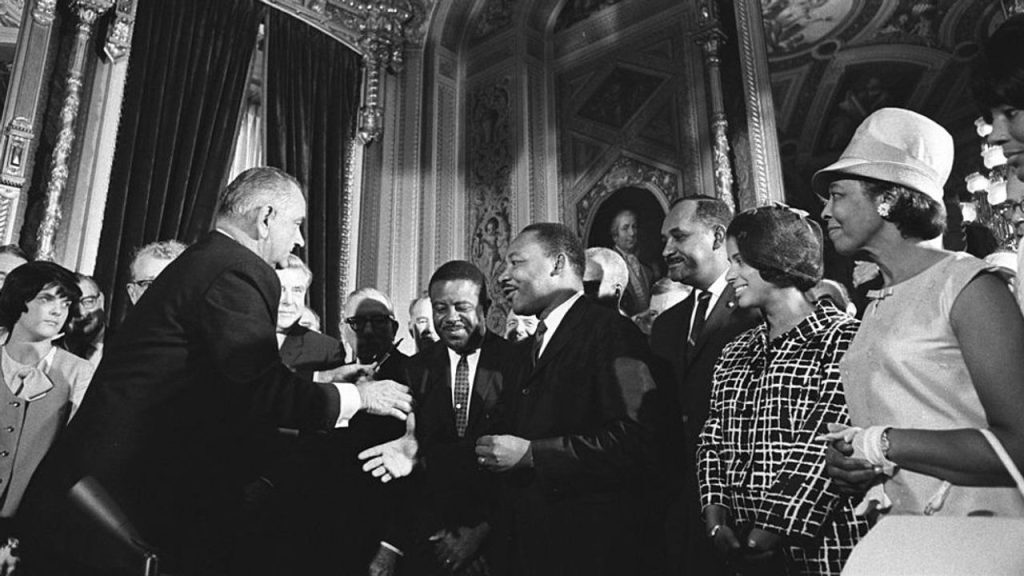
US appeals court guts Voting Rights Act
By Barry Grey
On Monday [20], the US Eighth Circuit Court of Appeals upheld a lower court ruling that effectively turns the landmark Voting Rights Act (VRA) of 1965 into a dead letter.
In a 2 to 1 ruling, the appeals court, based in St. Louis and overseeing the mid-US states of Minnesota, Iowa, North Dakota, South Dakota, Nebraska, Missouri and Arkansas, agreed with a US district judge in Arkansas that private individuals and groups such as the NAACP had no right under the law’s Section 2 enforcement provisions to bring legal challenges against redistricting decisions and other actions by states or localities that weaken the voting power of blacks or other minorities.

The ruling currently applies only to the seven states in the appeals court’s jurisdiction and is virtually certain to be appealed to the US Supreme Court. Earlier this month, the conservative Fifth Circuit Court of Appeals, based in New Orleans, issued a conflicting ruling on the same issue, affirming the right of individuals to bring such actions under Section 2 of the VRA.
If the US Supreme Court allows the Eighth Circuit ruling to stand, the evisceration of enforcement of the VRA will become the law of the land.
In an extraordinary rejection of decades-long legal precedent and practice under the VRA, and the express intent of Congress, US District Judge Lee Rudofsky in eastern Arkansas, a Trump appointee, in February 2022 dismissed a lawsuit brought by the Arkansas NAACP and the Arkansas Public Policy Panel challenging Arkansas’ new legislative map. Judge Rudofsky threw out the suit on the grounds that any such legal challenge had to be brought or joined by the US Justice Department. The judge argued there was no language in the text of Section 2 that explicitly grants “private right of action” under the VRA.
In upholding the ruling in Arkansas NAACP v. Arkansas, Eighth Circuit Appeals Court Judge David Stras, another Trump appointee and author of the majority decision, acknowledged that he was overturning what has been settled law for nearly 50 years. He noted that over the past 40 years, only 15 of 182 successful Section 2 cases have been “brought solely” by the US attorney general. He wrote further that while courts have “for much of the last half-century” assumed that private individuals and groups could sue to enforce the VRA, “a deeper look has revealed that this assumption rests on flimsy footing.” Stras was joined by Judge Ryamond Gruender, a George W. Bush appointee.
In his dissent, Eighth Circuit Chief Judge Lavenski Smith, also a George W. Bush appointee, wrote that “while admittedly, the Court has never directly addressed the existence of a private right of action under [Article 2],” the Court has “repeatedly considered such cases, held that private rights of action exist under other sections of the VRA, and concluded in other VRA cases that a private right of action exists under [Article 2].”
He continued:
“Until the Court rules or Congress amends the statute, I would follow existing precedent that permits citizens to seek a judicial remedy. Rights so foundational to self-government and citizenship should not depend solely on the discretion or availability of the government’s agents for protection.”
Many legal experts immediately blasted the Eighth Circuit ruling, decrying not only its substantive anti-democratic significance for voting rights, but also its radical judicial authoritarianism and contempt both for precedent and the intent of Congress in adopting the VRA.
Paul Smith, senior vice president of the Campaign Legal Center, said, “Eliminating individual people’s right to sue under Section 2 of the VRA runs contrary to settled law, common sense and any basic concept of fairness. When the government discriminates against people, they should have a right to fight back in court.”
Richard L. Hasen, professor of law and political science at the University of California, in a post on the Election Law Blog, wrote that the Eighth Circuit majority decision was based on “a wooden textualist analysis,” despite “recognizing that the Supreme Court and lower courts have for decades allowed such cases to be brought, assuming that Congress intended to allow such suits.” Hasen added that the appeals court majority “acknowledges that the legislative history of the passage of Section 2 leaves no doubt: Congress intended to allow private plaintiffs to bring suit.”
Wendy Weiser, director of the Democracy Program at the Brennan Center for Justice at NYU School of Law, said the appeals court ruling, if allowed to stand, would be “devastating to the enforcement of the Voting Rights Act.” She added the decision suggested that there exists “an environment where judges felt like it would be permissible for them to rewrite the law and upend precedent and core rights and protections.”
Should the US Supreme Court uphold the Eighth Circuit ruling, it would mark a major escalation in a mounting political and juridical assault on democratic rights in the US that has been underway for decades. It would bring to mind rulings that paved the way for the American Civil War, such as the 1857 Dred Scott decision, which blew apart all legislative attempts to contain the spread of slavery to the new states being carved out of US territories, place any restrictions on the institution of chattel slavery, or allow for the possibility of freed slaves becoming US citizens.
The current radical right Court has already struck down Roe v. Wade, abolishing at a stroke the constitutional right of women to obtain an abortion. It has also struck down a partial student debt relief program passed by Congress and bolstered the “right” of religious zealots to deny service to individuals based on their religious beliefs. It is serving as a spearhead of a legal counterrevolution being directed by the capitalist ruling class, which is mired in crisis, facing a growing rebellion by the working class, prosecuting a global policy of imperialist war and turning ever more openly to authoritarian and fascistic methods of rule.
In 2000, the Supreme Court in a 5–4 vote handed the presidency to the loser of the popular vote, George W. Bush, by halting the counting of votes in Florida. That ushered in the “war on terror,” the Department of Homeland Security, the institutionalization of drone assassinations, detention without trial and torture at places like Guantanamo.
Thirteen years later, the Supreme Court in a 5–4 ruling (Shelby County v. Holder) overturned Section 4 of the VRA, the “preclearance” provision that required states with a history of Jim Crow segregation and anti-black voter suppression to preclear with the US Justice Department any changes in voting procedures. It marked a major escalation in the attack on voting rights not just for blacks, but for the working class as a whole, including the imposition of voter ID requirements and other obstacles to ballot access for workers and poor people.
Now, with the Eighth Circuit ruling, a new stage in the assault on the VRA and democratic rights more broadly has been initiated. It is possible, for tactical reasons, that the Supreme Court could either reject or modify the ruling if and when it hears an appeal. Last June, the Court ruled in a Section 2 case that Alabama had drawn a racially discriminatory congressional map and ordered that the map be redrawn.
But any such ruling in an appeal of Monday’s Eighth Circuit decision would not mark a reversal of the capitalist court system’s intensifying assault on democratic rights. Recent developments, in fact, point to a drive by at least a section of the far-right faction on the high court to complete the evisceration of the VRA.
In a 2021 Section 2 case, Brnovich v. Democratic National Committee, the six right-wing Republican justices on the Supreme Court joined in a 6–3 decision upholding Arizona laws barring trade unions and advocacy groups from collecting voters’ mail-in ballots and banning out-of-precinct voting. The ruling, coming after Donald Trump’s attempt to overthrow the 2020 presidential election on the bogus grounds that mail-in ballots and other measures designed to facilitate access to the ballot during the pandemic were used to “steal” the election for Joe Biden, signaled that the right-wing Court majority would make it more difficult to successfully challenge new, restrictive election laws passed by Republican-led state legislatures following Trump’s failed coup.
This was made possible by the efforts of the Biden administration and the Democratic Party to conceal from the American people the complicity of large sections of the military and national security state apparatus, as well as major factions of the financial aristocracy and the bulk of the Republican Party officialdom, in Trump’s attempted coup.
Justice Neil Gorsuch, a Trump appointee, filed a one-paragraph concurring opinion to Justice Samuel Alito’s majority decision in Brnovich v. Democratic National Committee, in which Gorsuch “flagged one thing”—the fact that the Court had not directly addressed whether private individuals or groups could bring legal actions under the VRA against voting-related policies of state and local authorities. Gorsuch thereby signaled his support for the Court to reconsider its practice since the passage of the VRA in 1965 of accepting such legal challenges for review. Far-right Justice Clarence Thomas, notorious for his corrupt relations with billionaire fascistic Republicans, signed onto Gorsuch’s opinion.
[This article was originally published by the WSWS here on November 22, 2023]

